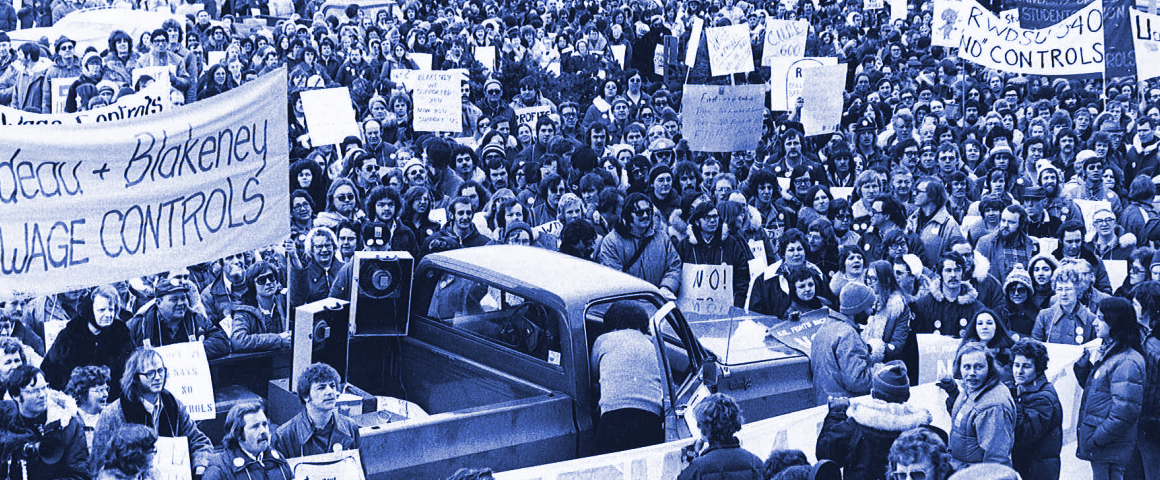By Dave McKee
This column and publication have long championed class struggle unionism. We celebrate instances of it within Canada, including the 1976 Canada-wide general strike, BC’s 1983 Operation Solidarity and the Ontario Days of Action during the 1990s. We promote those labour organizations that maintain a class struggle orientation, including international ones like the World Federation of Trade Unions. And we call, always, for more and more and more class struggle unionism.
But what do we mean by the term, and why is it so important?
Classes, not income groups
For starters, class struggle unionism means recognizing that we live in a capitalist society which is divided into social classes. We don’t mean the income-based categories like “middle class” that the mainstream media feeds us, but classes that are defined by their relationship to the economy.
Simply put, in capitalist society the means of production – factories, banks, mines, transport and communication industries, etc. – are owned by a minority (capitalists) who profit by exploiting the labour of the majority (the working class). While human labour, in combination with nature, is the source of all material wealth, workers own no means of production and must sell their labour power for a wage in order to live.
This means that there is a basic conflict in capitalist society between capital and labour – between bosses and workers. The two sides’ interests are directly opposite to one another, as capitalists try to extract more profit from the exploitation of workers, while workers fight to improve their wages, living and working conditions, and economic and social rights. This is the heart of the class struggle under capitalism – it affects the whole of society, and it ultimately compels the working class to change the social system itself.
For unions, this means recognizing that workers create the wealth that billionaires steal for their own enjoyment. This is true for both public and private sector workers. The task is to take back that wealth for those who produce it – to workers, their families and communities, in the form of higher wages, better benefits and pensions, and more corporate taxes. And that requires a combative approach which places demands on capitalists and their governments, and mobilizes the entire union membership into the struggle.
The state is not neutral!
Class struggle unionism also recognizes that the state is not a neutral body. A central fact of political life in Canada is that state power is in the hands of Canadian finance capital – the owners of the large-scale means of production, trade and finance control state machinery like the armed forces, police, judiciary and civil service. So, the state is an instrument of class rule.
This is why, while we have “democratic” elections to select this or that government, the state structure itself is constantly used to thwart people’s struggles. We see this through state intervention to undermine free collective bargaining and the right to strike, picket and organize. We also see it through police and courts action against picket lines and demonstrations, as well as through state efforts to block and roll back labour and democratic rights.
What this means for the union movement is that all gains for working people must be won and defended through struggle. While parliamentary efforts like elections and lobbying can be part of this struggle, they cannot replace – and must arise from – extra-parliamentary mass mobilization of the working class and its allies. We can elect as many “friends of labour” as possible, but that doesn’t change the fact that the state is a partisan, active and increasingly authoritarian force on the side of finance capital. Escalating mass action by working people is the path forward.
Unions are organizations of the working-class
We often think of unions as being restricted to a specific workplace or trade. After all, one of the single biggest elements of union work is negotiating and enforcing collective agreements with a specific employer. Labour legislation tends to strictly fence unions into this type of activity alone, through laws that prohibit job action during the life of a contract, limit or ban political campaigning, or impose limits on how unions funds can be spent.
But unions are not creatures of a workplace, and certainly not of government legislation – they are working-class organizations created by workers specifically to protect and advance their economic interests as wage workers. Unions are the basic organizations of class struggle.
Union gains serve the interests of all working people, organized and unorganized, by helping to raise living standards and social conditions for the working class and working people in general. To blunt this fact, the ruling class wages a systemic ideological campaign to turn working people against unions.
This means that union work cannot be isolated to individual workplace issues for the benefit of their own members, but must extend to the entire working class. This includes unemployed and retired workers, unorganized workers, as well as youth and students. It includes struggles on societal issues like gender, racial and national equality, and global issues like peace, international solidarity and climate justice.
Labour unity, on the basis of struggle
Different unions have different areas of concentration and specialization, which can be quite powerful during sharp struggles. But dividing unions by sector, trade, geography or nation can also lead to narrowness, parochialism and isolation.
The ruling class, including the government, encourage this trend toward division by pitting unions against one another in jurisdictional battles, typically favouring the ones it deems most pliable. Opportunistic “business unionist” leaders often become complicit in this process, as they place the narrow aim of increasing their dues paying membership above the task of strengthening the working-class movement, advancing the class struggle and improving conditions for all working people.
But at the same time that the ruling class tries to weaken the labour movement through division, the struggle between the working class and capital continues to sharpen. The ongoing all-sided attack to weaken and destroy the union movement is a key part of the corporate drive to lower real wages and living standards. The campaign to reduce labour’s bargaining strength and extract concessions includes direct state intervention and the maintenance of mass unemployment, what Marx and Engels called “the reserve army of labour.”
A critical part of the struggle against finance capital (“corporate rule”) is opposing concessions and expanding the scope of unions’ bargaining power. But this cannot proceed so long as there is disunity, narrowness and isolation within the union movement.
For class struggle unionism, it is critical to unite labour’s ranks around class-oriented militant actions which confront the offensive from corporations and their governments. Last year’s struggle by the Quebec Common Front showed that unions in different centrals can be united into coordinated campaigning and escalating mass action, and they can win results for working people. Unity on the basis of class struggle can bring about democratic and anti-monopoly transformation, a key foundation for shifting the balance of class forces in favour of the working class and its allies.
To unite people into a left political movement capable of winning far-reaching gains, the labour movement needs to constantly build and rebuild its ranks – both in terms of numbers and in terms of political consciousness and organizational capacity. This requires a class struggle orientation and a political and social agenda which extends to the entire working class and people as a whole, to win the popular support necessary to oppose and defeat opportunism and class collaboration while building a mass movement capable of changing the social system.
Support working-class media!
If you found this article useful, please consider donating to People’s Voice or purchasing a subscription so that you get every issue of Canada’s leading socialist publication delivered to your door or inbox!
For over 100 years, we have been 100% reader-supported, with no corporate or government funding.




